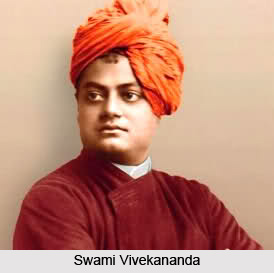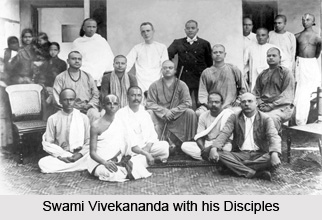 Swami Vivekananda is mainly popular as a flag bearer of India, monk par excellence. He is generally credited with putting forth the soul of India to the Western society. He is referred to as the spokesperson of the Hindu Religion. He had a two fold personality- spiritual and social. Often it has been seen that his spiritual self has got the better of social self. It may seem that "Vivekananda", was fully drowned under the immense weight of "Swami".
Swami Vivekananda is mainly popular as a flag bearer of India, monk par excellence. He is generally credited with putting forth the soul of India to the Western society. He is referred to as the spokesperson of the Hindu Religion. He had a two fold personality- spiritual and social. Often it has been seen that his spiritual self has got the better of social self. It may seem that "Vivekananda", was fully drowned under the immense weight of "Swami".
On Poverty
Although Swami Vivekananda was a man of meditation and religion, he was game for activity and work that would lead to rise in productivity and eradication of poverty. He along with his mentor, Ramakrishna Paramahamsa, has always said that "religion is not for empty stomachs." He has literally helped to shock people out of their comfort zone and inspired them into action. So we see that Swamiji triggered the course of life in modern India by motivating the Rajasic virtues in the Indian denizens. He also inspired them to enhance their present condition and not be content with the current life of degradation and poverty. According to Vivekananda, religion had to be the primary and steering force in executing al the social changes in the country.
On India`s Cultural History
There is no doubt that Swamiji took immense pride in the India`s inheritance from the past. But he was totally against the fact that almost everything that came from the past was worth admiration. To him, India was a representation people, and people meant masses. Eradication of poverty, removal of illiteracy, restitution of human dignity, liberty from fear, availability of spiritual and secular knowledge to all, irrespective of their class, caste, and ending of all the monopolies, economic, religious, intellectual, cultural and social- all these together made up a part of what he got from his Vedantic Socialism or Vedanta.
 With his re-interpretation of Vedanta, and is deep rooted concern for the masses and their issues, Swami Vivekananda gave India a new lease of life. He raised his voice against the feudal and colonial oppression, and at the same time Swamiji looked for answers regarding the India`s historical destinies, and ways to transform it into strong, wealthy and independent state. He always reiterated the fact that India could only be built with the help of masses, small groups of energetic patriots, brave and strong with "muscles of iron and nerves of steel and gigantic wills".
With his re-interpretation of Vedanta, and is deep rooted concern for the masses and their issues, Swami Vivekananda gave India a new lease of life. He raised his voice against the feudal and colonial oppression, and at the same time Swamiji looked for answers regarding the India`s historical destinies, and ways to transform it into strong, wealthy and independent state. He always reiterated the fact that India could only be built with the help of masses, small groups of energetic patriots, brave and strong with "muscles of iron and nerves of steel and gigantic wills".
On Women
Swami Vivekananda was never in active politics, yet he had a political sense on the modern India which was far superior and much ahead of his time. He expressed immense outrage over exploitation of rights and showed genuine concern for uplift of women mass and other socially backward people. He wanted a distinct social reform with the help of Western ideas and technology, yet not entrapped us with slavish imitation of the Western ways of life. In his book, "On India and Her Problems", he wrote: "Remember that the nation lives in the cottages. But, alas, nobody ever did anything for them. Our modern reformers are very busy about widow-remarriage. Of course, I am a sympathiser in every reform, but the fate of a nation does not depend upon the number of husbands the widows get, but upon the condition of the masses". Vivekananda went a step further and said, "So long as millions live in hunger and ignorance, I hold every man a traitor." The revolutionary doctrine he propounded has serious influence on the social reformers that followed- dynamism of Mahatma Gandhi and the socialistic ideas of Jawaharlal Nehru were highly inspired by Swamiji`s ideas and teachings.
On Religion
Swami Vivekananda`s thoughts on religion were unique. He gave India, its secularist ideas which now form an integral part of Constitution of India. His views on religion were based on common objective. He propounded all religions were but different paths that led to the same goal. His ideas were an extension of what is present in India. His thoughts were not only based on mutual respect and tolerance, but mutual realization of basic truth that underscores all individual religions. He was completely against the practise of untouchability. His learning from Vedanta made him a staunch critic of the concept of untouchables. He found neither religious sanction nor secular logic behind the terrible practice of untouchability and he went all out to condemn it.
On Education
Swami Vivekananda`s ideas on education are modern than the educationists that prevailed in ancient India. Right from the beginning he was instrumental in mass development and uplift. Furthermore, he had conceived of so many decades back what we now call informal education. He laid special stress on technical education and industrial training which have now become an essential part of the educational system of modern India.
Vivekananda worked towards educational rights for women. He laid special stress on conventional values of family life and chastity for women, but was totally against their subjection. He passionately pleaded for the extension of all educational facilities to women. His social reform ideas reflected greatly on his efforts to give India its traditional religions a new orientation of social service. With the establishment of Ramakrishna Mission, he propounded a new path for Indian monks and Sanyasins. So now we see that Hindu monks do not live an isolated life, on the contrary they are concerned with proving their service to the society. They have set up hospitals, educational institutions, dispensaries, orphanages and other community institutions for alleviating human misery.
As a Role Model
Thus, one sees Swami Vivekananda is a pioneering figure in India who has played in integral part towards shaping of modern India. Socialism, secularism, mass uplift and mass power, treating the untouchables with compassion, universal literacy, informal education, women`s liberation and inculcation of social service as a part of religious worship- these constituted the basic points for reforms by Swami Vivekananda. His famous words; "Awake, arise, and stop not till the goal is reached" - still resonated among the youth of the nation, rousing their social consciousness and kindling their damp spirits.




















